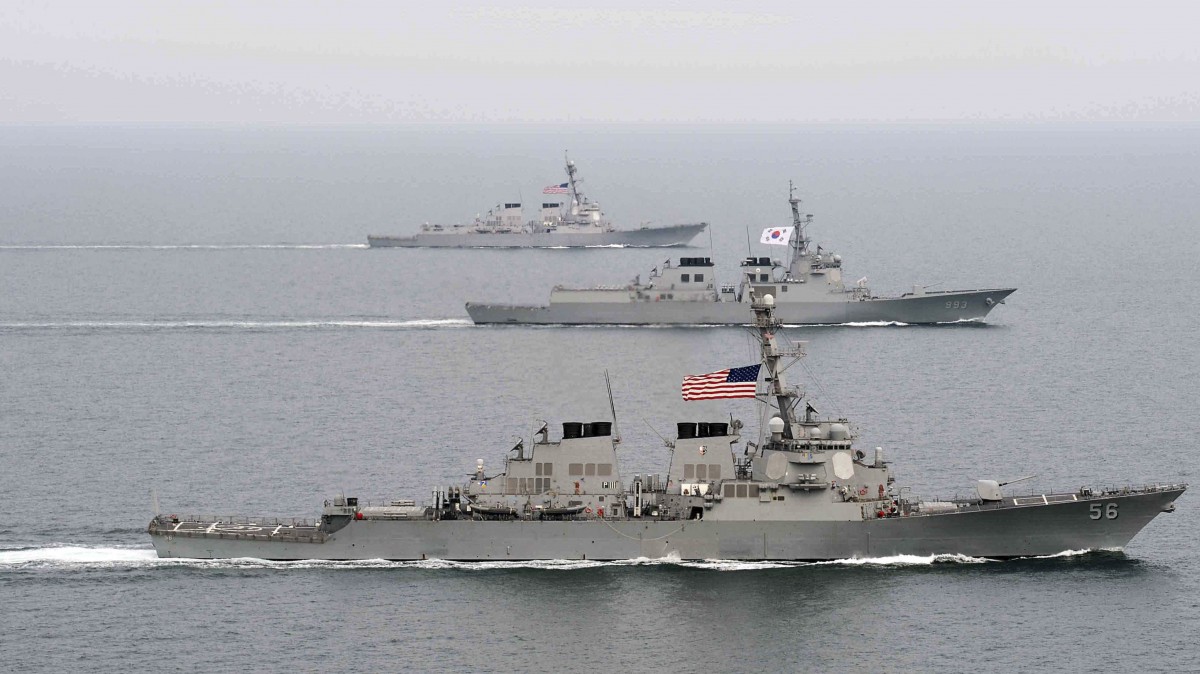If markets have been blissfully ignorant of potential fallout from the simmering US-China trade dispute (even if corporate executives are bracing for the worst), just imagine how they would react to the reality of a military confrontation.
Which brings us to an ABC News report published Monday evening detailing just how close Chinese ships came to actively confronting the USS Decatur while the US ship was carrying out yet another in a series of “freedom of navigation” operations – or “freeops” – in the South China Sea. The Navy destroyer had to maneuver to avoid a Chinese ship that came within 45 yards of its bow while the Decatur was sailing through the Spratley Islands on Sunday in what was the closest direct confrontation between US and Chinese ships since Trump’s inauguration (after which the Navy began conducting these freeops with increasing frequency).
The encounter, which comes at a time of strained relations between the world’s two largest economies driven largely by Trump’s aggressive trade policy, was characterized as “unsafe and unprofessional” by Navy officials.
“At approximately 0830 local time on September 30, a PRC LUYANG destroyer approached USS DECATUR in an unsafe and unprofessional maneuver in the vicinity of Gaven Reef in the South China Sea,” said Capt. Charlie Brown, a U.S. Pacific Fleet Spokesman.
Gaven Reef is located in the Spratly Islands chain in the South China Sea where China claims seven man-made islands as its own.
The close encounter with the Chinese warship occurred as the American destroyer was carrying out a freedom of navigation operation (FONOPs) in the Spratlys, the U.S. said.
The U.S. Navy routinely undertakes FONOP missions worldwide to challenge excessive territorial claims of international shipping lanes.
USS Decatur had sailed within 12 nautical miles of Gaven and Johnson Reefs in the Spratly Islands when it was approached by the Chinese destroyer.
During the brief encounter, the Chinese destroyer’s aggressive maneuvers were accompanied by demands that the Decatur leave the area.
The Chinese Navy “destroyer conducted a series of increasingly aggressive maneuvers accompanied by warnings for DECATUR to depart the area,” Brown added.
“The PRC destroyer approached within 45 yards of DECATUR’s bow, after which DECATUR maneuvered to prevent a collision,” said Brown.
A U.S. defense official characterized the close encounter as having been of short duration.
Chinese vessels have approached U.S. Navy ships during previous FONOPs in the South China Sea, but Sunday’s encounter appears to the be the closest one yet.
“U.S. Navy ships and aircraft operate throughout the Indo-Pacific routinely, including in the South China Sea,” said Brown. “As we have for decades, our forces will continue to fly, sail and operate anywhere international law allows.”
Earlier Monday, reports surfaced that China had called off a security conference with US officials. The cancellation was later confirmed by the US. This latest sign of a deteriorating relationship came after the US Air Force flew a B-52 bomber on a mission through the East China Sea while two other B-52 flights were carried out through the South China Sea.
While the the notion of a shooting war between the US and China may seem remote to casual observers, some market observers have noted the time honored progression of economic tensions like trade wars and currency wars eventually leading to a full-on hot war.
At the very list, it’s a risk that certainly deserves attention.
Top Photo | South Korea and U.S. warships participate in their joint military drill Foal Eagle in South Korea’s West sea, March 17, 2013. (AP/South Korea Navy)



